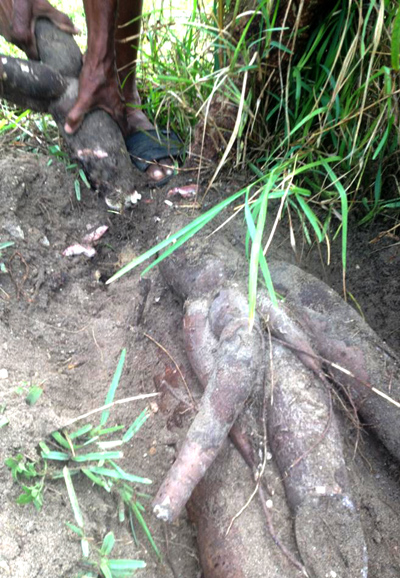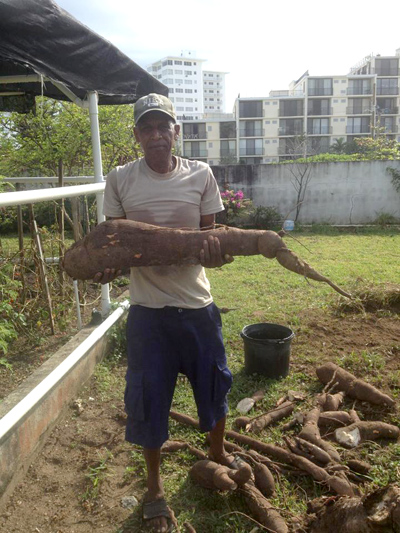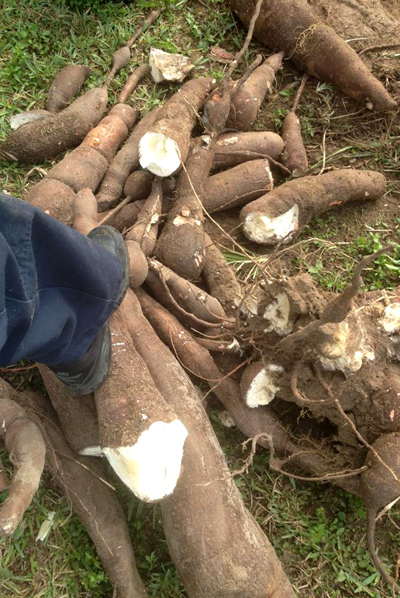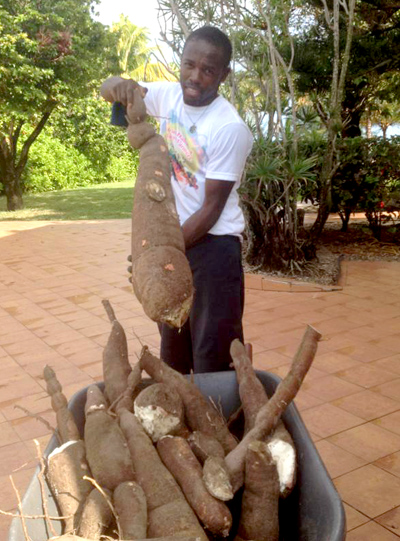|
|

|

|
 |
|
Last Updated: Feb 6, 2017 - 2:32:04 PM |

Cassava (Yuca) growing in Grand Bahama Island, The Bahamas.
|
The 22nd of April is the date celebrated all around the world as Earth Day. Since today is Earth Day I decided to showcase a product of Mother Nature, to show people how amazing this planet can be, and how she does things that will never be replicated, no matter how intelligent man thinks he is.
This is a Cassava! The Cassava or Yuca is one in the same and is said to have originated in Brazil or Paraguay, but you can find them almost everywhere in the world today. The Cassava is a crop that most believe when planted will deprive the soil of all its nutrients. Others believe because of its high starch content that it is detrimental to the human body which is not true.
Cassavas are one of the “ole folks” favorite food in the Caribbean. In fact it was a major crop of the Amerindians, and although we seldom see it on our plates, it came as a great shock to me when I found this cassava stump in Grand Bahama’s very own Bikini Gardener’s yard while helping her with one of her projects.
Being acquainted with the various shapes and sizes since childhood I can definitively say I have never seen a cassava stump of this magnitude. From my first inspection of the specimen I found a root system that was simply unbelievable! When I started digging it was a jaw dropping experience, because I thought I knew how big cassavas could get! This one was a freak of nature!
I had to show someone else, and so I brought my stepfather with me to share in this moment, because undoubtedly I knew he had never seen one of this size before.

"I brought my stepfather (seen here) with me to share in the moment."
|
Cassavas are great for the garden, they have the ability to loosen up compacted soil which is a preferred alternative to tilling; as we know the tilling of soil causes damage to the eco-system, effectively killing billions of essential microbes, bacteria, insects and worms that reside in the soil and are necessary for plant life.
Our ancestors have been eating cassavas for thousands of years with no adverse side effects, the key was moderation. If we know the cassava has a high starch content and we also know that the body has a limit for the intake of starch then why abuse it.
Cassava has also been used in herbal remedies as well, from its leaves to its roots multiple applications have been developed for use on sores and various other illnesses. Scientists have also been using cassava in their research. During the 1990’s a British researcher, along with a specialist in Spain identified a cassava gene that helps kill cancer within mice trails. They were conducting studies on the Linamarase gene and they found that when they infused the gene with linamarin it effectively eliminated the cancer. The reason researchers believe it effective is because of the cassava ability to produce Cyanide.
It is also good to know that research is still ongoing, but I believe that mother nature enacts a cure for every species differently, and who knows where the cassava will lead. It is my belief that most of our disease today comes from a lack of proper nutrition. Arguably, if cassava is so unhealthy, then why is it present in so many of our foods products? And if cassavas are so bad for us then why are they found in so many of our food products, from baby foods to alcoholic beverages?

Cassava grown in Grand Bahama Island
|
Fact is, there are many crops in the world today that get a bad rap on the open market and they do for various reasons. Some of these crops are given bad names because of their rumored effects without individuals properly understanding their content; people will sometimes discard these foods completely forgetting its purpose in the garden, and on the dinner table.
Big business has a great influence on the market, therefore if they want farmers growing a particular crop to support their business, they will put out bogus facts to derail the production of certain crops. However, the Cassava will not be forgotten, and that’s why countries like Nigeria have placed such a big bet on the Cassava, because in the end, this crop will make its come back.
With this article I celebrate the cassava, and Earth Day is a celebration of Mother Nature, not a memorial of our slow destruction of her resources.
Happy Earth Day Everyone!
About the Author:
Luckner Timothee is a backyard Farmer in Grand Bahama since starting
his garden a few years ago he has wooed his friends with his produce and
creative farming ideas. He continually learns from his friends and
family about the process of farming and the struggles that a farmer goes
through daily. He is now working on a Web show called “Let’s Grow
Bahamas” to be released on “Grand Bahama Backyard Farmers”. He is
attending seminars in order to meet other farmers around the world and
to further his knowledge about Farming. To contact Luckner Timothee
email him at:
bahamasfarmers@live.com

The author holds cassava grown in Grand Bahama.
|

© Copyright 2013 by thebahamasweekly.com
Top of Page
|
|
 |

|
